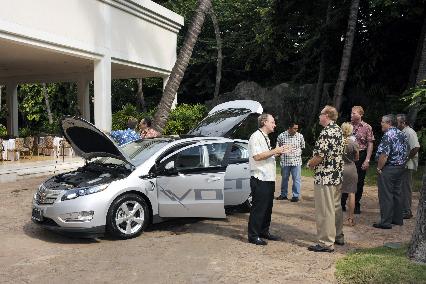Maui Electric Vehicle Alliance Kicked Off Today

Attendees of the Maui EVA kickoff meeting inspect a Chevy Volt. Photo credit by Jose Morales, courtesy of Maui No Ka Oi Magazine.
By Sonia Isotov
The University of Hawaii Maui College and the State of Hawaii Energy Office along with a consortium of partners met today at the Grand Wailea Hotel to launch the Maui Electric Vehicle Alliance (Maui EVA).
Together they will create an overall county-wide plan for infrastructure improvements for the adoption of electric vehicles (EVs), making Maui a green energy model for electric vehicles and smart grids.
Seeded with a $300,000 grant from the US Department of Energy as part of its Clean Cities Initiative Awards, the Maui EVA is a consortium of partners ranging from the University of Hawai’i Maui College, Hawai’i State Energy Office, Honolulu Clean Cities and 30 other Hawai’i government, business, and organization partners.
Maui EVA decided that the quickest way to accelerate adoption would be to target Maui County companies, hotels, and state parks that serve the visitor industry, encourage them to partner with Maui EVA, and collectively create the infrastructure needed.
“We estimate that 15-20% of the vehicles used on Maui are rental cars driven by visitors, a much higher density than in other cities or counties of comparable size elsewhere,” said Susan Wyche, UHMC special project coordinator, in a written statement following the kick-off.
“With such short driving distances, EVs are the perfect choice for visitors coming to enjoy our island. But to give them that option, we need the support of rental car companies, as well as public charging stations at hotels, state parks, and other recreational sites. Once an island-wide infrastructure is in place, residents will be able to use those charging stations, and rental car companies, like Enterprise and Hertz, will be able to sell their EV fleet to the local Maui market instead of shipping them elsewhere.” Wyche continued.
Along with car rental companies, auto dealers understand the benefit of creating charging stations as the demand for EVs increases. October saw the arrival of the first Chevy Volt on Maui at Jim Falk Motors. They’ve already sold several Nissan Leafs.
“We’ve sold close to 35 EVs this year, and the demand is increasing every month,” says Andy Stehl, sales consultant for Jim Falk Maui Motors, in the statement. “We’ve heard from customers that the lack of charging stations really influences their decision to choose an EV. More charging stations would definitely expand the market.”
Developing the infrastructure for EV use will also help drive the green economic engine for Maui County. Once the infrastructure for advanced charging stations are built, charging stations will require maintenance technical support, creating even more “green” jobs.
“The State is committed to build a clean energy economy with new businesses and new jobs for our residents. The green workforce, already a fast-growing segment in Hawaii, is expected to grow by more than 25% next year,” said Mark Glick, administrator for the State Energy Office “We’re among the top three in the nation for green job growth and Maui is leading the way with the most green jobs in the state. More EVs on the road will mean less use of imported oil, a great contribution to the State’s 70% clean energy goal.”
To prepare the workforce, UHMC will train auto repair technicians as well as electricians, contractors, engineers and managers with the technical skillset they need through the Sustainable Construction, Trade Apprenticeship, Engineering Technology and Sustainable Science Management programs and degrees.
To promote adoption of electric vehicles, Maui Electric Company (MECO) is proactively working to integrate higher amounts of clean energy and ensure a safe and reliable electrical grid. Members from the Japan-US Smart Grid Community Demonstration Project (Japan Smart Grid Project) also met today at the Grand Wailea Hotel to address those issues.





_1768613517521.webp)

